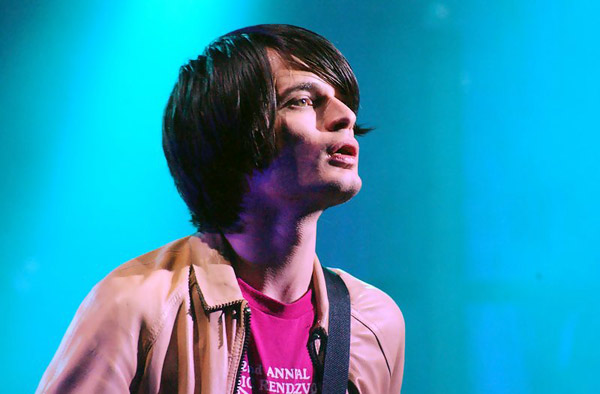By Paul KilbeyAdapted from a piece on I Care If You Listen
I really want to like Jonny Greenwood’s compositional career. Radiohead were the first band I loved, and I think that they helped shape my musical tastes and aesthetics more than most composers. I recall excitedly pre-ordering Greenwood’s first classical foray, the soundtrack to the film Bodysong, as soon as I found out about it back in 2003. And I was thrilled the following year by the announcement that he had been recruited to the position of Composer in Residence for the BBC Concert Orchestra. This was evidence, to my excitable teenage brain, that pop music was real, that it could achieve things, that my school music teacher was wrong. Pop music mattered. There was a composer in Radiohead.
 Jonny Greenwood
Jonny Greenwood
I know that’s not how it works, now. Pop music does matter, but composers have nothing to do with it. Some of the best pop music is the least composerly, and much of the most strongly ‘composed’ pop is boring. Pop has its own complexities and quandaries, and they do not relate to manuscript paper. (Or engraving software.) The presence of a nominal ‘composer’ in a band proves precisely nothing in terms of the music’s seriousness, importance or quality, and writing ‘classical’ music rather than pop is not actually a sign of sophistication. There is no sense in which Greenwood’s straying into the classical realm denotes a musical coming-of-age. By that logic, we’d all have to take the Liverpool Oratorio more seriously than Sgt. Pepper, after all. There are, at bottom, different ways to make and write music, and these different ways do not arrange themselves into a neat quality-based order.
This isn’t to say that becoming a classical composer doesn’t require a high degree of artisanal nous, such as is only really attainable by working through years of specific, intricate study. This is why, even for a non-composer like me, it’s kind of annoying when a popular musician just wanders into classical music and has a bash at it, and pop musicians from indie star Owen Pallett to Imogen Heap could be accused of this to varying degrees. Cross-genre musical projects may be great in concept, but you have to do your homework. Otherwise it’s not really cross-genre, so much as just a bit ambiguous.On the other hand, Jonny Greenwood—the most famous such cross-genre project—doesn’t fall into this trap at all. A CD recently released on the Nonesuch label, which pairs two of his works with two of Krzysztof Penderecki’s, displays the Radiohead man in a fairly erudite light. Greenwood appears a willing pupil to Penderecki in these works, and no fool. But the music by him on the disc is still so clearly not yet there that one has to wonder if he currently merits this much airspace.
I should be clear: I’ve heard Greenwood’s music twice in concert, and it’s been enjoyable, both times. His piece Doghouse was given a beautiful performance from the London Contemporary Orchestra in March, in which his basic talent as a composer was evident. It’s not like he doesn’t know how to write music, and (Doghouse being quite a recent composition) it seems he may well be improving.
And I also went to a concert performance of the contents of this CD which—like the disc, from the AUKSO Chamber Orchestra with Marek Mos and Penderecki himself—I enjoyed, feeling at least interested in the Greenwood works. They are, certainly, fascinating at times, and he has a brilliant command of orchestral colour (it’s this which makes Doghouse so compelling as well). But the repeated listens to Popcorn Superhet Receiver and 48 Responses which the CD afforded me have not increased my sympathy for these works, or hence for Greenwood as a composer overall.
Particularly, the 48 Responses become tiresome fast. The idea in this piece is to take the shock C major ending of Penderecki’s (mostly atonal) Polymorphia and to attempt to contextualise it somehow. We are hence left with a bizarrely high number of jarring C major chords, and little sense of direction (directionlessness is a common problem in Greenwood’s orchestral music). Similarly, the first two pieces on the CD, Penderecki’s famous Threnody for the Victims of Hiroshima and Greenwood’s Popcorn Superhet Receiver, essentially just make the latter piece sound like an inferior version of the former, with the occasional extra funky rhythmic bit. Overall, listening to Greenwood straight after Penderecki is a bit like listening to something by Muse, straight after OK Computer.
There remains plenty to admire in Jonny Greenwood’s music: it is sonically gorgeous, and—especially when his work is played live—it’s clear that this composer has talent and potential. But at the moment, Greenwood still seems to be in the Pablo Honey stage of his classical career. While I look forward to hearing what comes next, this isn’t music which yet deserves the platform it’s been given.
Paul Kilbey writes on music and culture for publications including Culture Wars, Huffington Post (UK) and Bachtrack. Follow him on Twitter @paulkilbey.